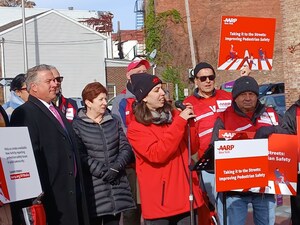AARP NY Warns Scammers Love a Holiday; Fraudsters Target Veterans, Others Today
Association Releases Tips to Avoid Falling Victim to Scams
NEW YORK, Nov. 11, 2014 /PRNewswire-USNewswire/ -- Scammers love a holiday, and as Americans celebrate Veterans Day today, AARP New York is warning veterans and those who love them to beware of fraud.
AARP has identified year-round attempts to defraud veterans and to take advantage of those who appreciate their sacrifice and service – even in the name of love.
Although all types of charity scams tend to increase during the holiday season, Veterans Day and Memorial Day are prime time for swindles in the name of service personnel.
"Today we recognize veterans for protecting our freedom, and AARP wants to make sure they're aware of scammers who have no regard for their sacrifices," said Beth Finkel, State Director of AARP in New York State.
Among the most common schemes involving veterans, and tips for avoiding them:
Charity scams: Bogus charities claim to benefit veterans and are among the most successful schemes, especially in duping older donors. (Other hot-button hoaxes claim to provide help to disaster victims, sick children, and police and firefighters.).
Tips: In solicitation emails, don't click on attachments or links - which can unleash a computer virus. Ask callers for the organization's phone number, then call the number to make sure a campaign is underway. Authenticate charities by checking names and reputations at the Wise Giving Alliance (operated by the Better Business Bureau), Charity Navigator or GuideStar, or by contacting the state agency that regulates charities where you live. Never provide a credit card number to telemarketers (unless you initiate the phone call) and beware of any group that offers to send a courier to pick up cash or a personal check at your home.
Phishing: The Department of Veterans Affairs (VA) does not make unexpected telephone or email requests for personal or financial information already on file, or to announce program changes. Official correspondence comes by U.S. mail.
Tips: Before providing any details, verify requests by calling VA toll-free phone numbers.
Benefits schemes: Some scams promise cash payouts for pensions, and future benefits for disabled vets, but typically pay only 30 to 40 percent of their actual worth, according to the Better Business Bureau. Other hoaxes involve self-proclaimed "veterans advocates" who promise additional VA benefits by transferring retirement assets into an irrevocable trust that's unsuitable for many older vets. And the VA does not charge for services like filing pension or other claims or getting military records. But scammers do.
Tips: Beware of official-sounding names, and don't depend on nursing homes, community centers and assisted living facilities to protect you; often they are paid a fee to let volunteers give presentations. Get credible information on how to qualify for veterans benefits through your state veterans affairs agency at nasdva.net. Before investing, check the agent's record at your state regulatory office by visiting www.nasaa.org/about-us/contact-us/contact-your-regulator/.
Job scams: Since past military service appeals to many employers, scammers advertise phony positions on Internet job boards specifically trying to recruit veterans in an effort to glean personal or financial information for identity theft. Another online ruse involves classified ads offering cars or other items, placed by scammers who pose as soldiers facing deployment or as families of those killed in action. They seek upfront payment for a bargain that never materializes.
Tips: Make sure you see the car and test-drive it. Check Edmunds.com or Kelley Blue Book for realistic pricing information by vehicle year, make and model—along with direct access to local inventory via AutoTrader.com, which you can search by ZIP code. Get a photocopy of the vehicle title and registration, and do a CarFax check of its vehicle identification number to ensure its existence, location, and accident and repair history.
Romance scams: On internet dating websites and in online chat rooms, scammers pose as active-duty or retired military personnel to lure the lovelorn into responding to inevitable requests for money.
Tips: Look for poor spelling and bad grammar, the bogus 23401 zip code and photos of unusually good-looking potential matches that were actually lifted from on-line modeling sites. And don't provide your mailing address.
Those are among a number of seasonal scams to avoid.
To help Americans combat scams and identity theft, AARP has established a Fraud Watch Network that offers everyone access to information about how to protect themselves and their families.
Follow us on Twitter: @AARPNY and Facebook: AARP New York
AARP is a nonprofit, nonpartisan organization, with a membership of more than 37 million, that helps people turn their goals and dreams into real possibilities, strengthens communities and fights for the issues that matter most to families such as healthcare, employment and income security, retirement planning, affordable utilities and protection from financial abuse. We advocate for individuals in the marketplace by selecting products and services of high quality and value to carry the AARP name as well as help our members obtain discounts on a wide range of products, travel, and services. A trusted source for lifestyle tips, news and educational information, AARP produces AARP The Magazine, the world's largest circulation magazine; AARP Bulletin; www.aarp.org; AARP TV & Radio; AARP Books; and AARP en Español, a Spanish-language website addressing the interests and needs of Hispanics. AARP does not endorse candidates for public office or make contributions to political campaigns or candidates. AARP Foundation is an affiliated charity of AARP that is working to win back opportunity for struggling Americans 50+ by being a force for change on the most serious issues they face today: housing, hunger, income and isolation. AARP has staffed offices in all 50 states, the District of Columbia, Puerto Rico, and the U.S. Virgin Islands. Learn more at www.aarp.org.
SOURCE AARP New York
Related Links
WANT YOUR COMPANY'S NEWS FEATURED ON PRNEWSWIRE.COM?
Newsrooms &
Influencers
Digital Media
Outlets
Journalists
Opted In





Share this article